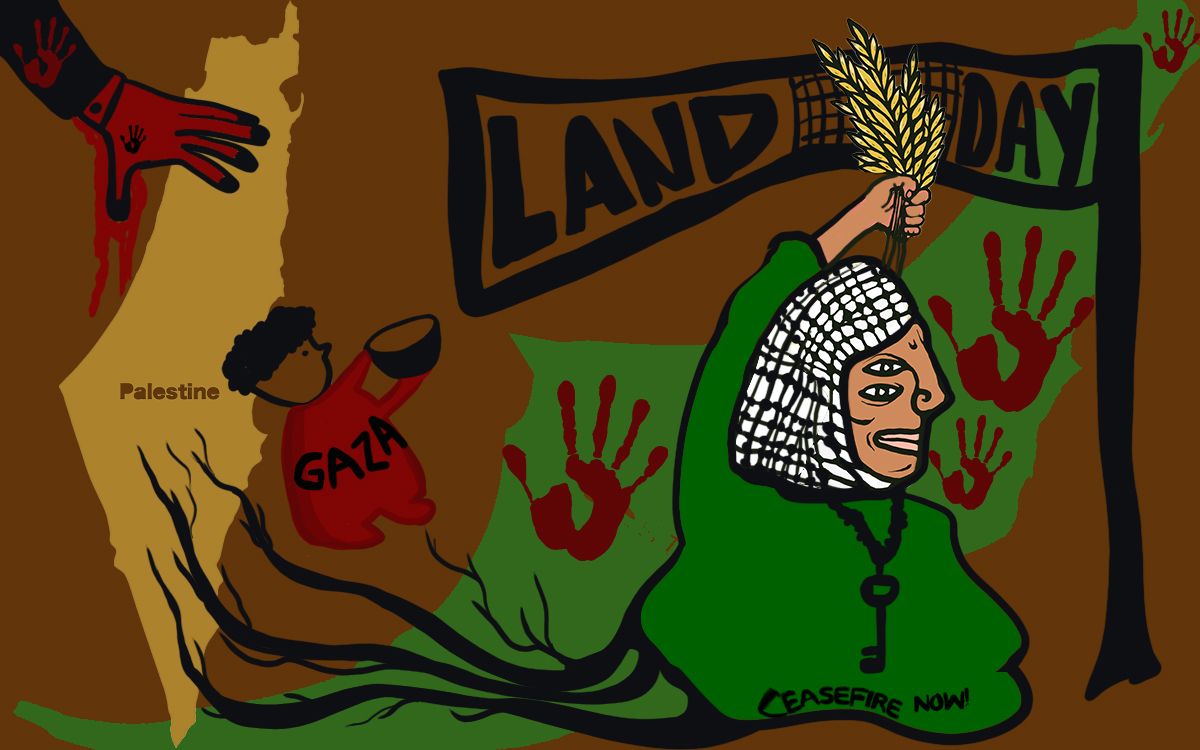UAWC : On the Occasion of Palestine Land Day

In commemoration of Land Day, the Union of Agricultural Workers’ Committees (UAWC), the Palestinian member organization of La Via Campesina, published a declaration.
Below is the full text of the declaration:
Today and every day, the Union of Agricultural Work Committees honors our land and its stewards: the steadfast peasants, farmers, herders, and rural communities who have protected it with their labor, love, and resistance. As we commemorate this day, we reaffirm our unwavering commitment to defending our land, protecting our communities, and resisting the settler colonial forces seeking to erase us.
Land Day marks the Palestinian people’s collective uprising against Israeli systemic land theft and dispossession. On March 30, 1976, Israeli forces massacred six Palestinian protesters during mass demonstrations against the Israeli occupation’s theft of thousands of dunums of Palestinian land in the Galilee. Since 1976, the struggle has only intensified. Today, the Israeli settler colonial project and ethnic cleansing campaign continue to steal land, forcibly displace communities, and intensify its structural oppression across all of Palestine.
The Israeli occupation is expanding its colonial infrastructure at record speed. It stole more land in 2024 than in the previous 20 years combined and is on track to surpass this record in 2025. In the first three months of 2025, the Israeli government has approved around 12,000 settlement units in the West Bank, already exceeding the around 10,000 approved in 2024. Further, since the beginning of 2025, the occupation has already stolen over 16,000 dunums, retroactively legalized 13 settlement outposts, and Israeli settlers continue to terrorize communities on a daily basis. As of the end of 2024, the Colonization and Wall Resistance Commission reports over 770,000 settlers in the West Bank and Jerusalem across 180 settlements and 256 colonial outposts. Of these outposts, 138 are classified as agricultural or pastoral, illustrating how the occupation uses agriculture as a tool for land theft. In 2024 alone, Israeli settlers established 51 new colonial outposts, 36 of which are pastoral.
Simultaneously, the people of Gaza endure mass destruction and starvation as the Israeli genocidal war continues, targeting critical infrastructure, food systems, and the basis for life.
The UN Food and Agricultural Organization (FAO) reports that, as of the end of 2024, 75% of all cropland in the Gaza Strip has been damaged, with North Gaza experiencing the highest proportion of cropland damage at 84.1%.
Further, the Israeli occupation has prevented food, medical supplies, or any humanitarian aid from entering the Gaza Strip. This use of food and essential resources as weapons of war is a hallmark of Israeli systematic violence against Palestinians. The destruction of key agricultural infrastructure, combined with the 17-year blockade, has destroyed Gaza’s ability to sustain itself. Israel’s strategy encompasses the weaponization of food to create a state of famine in Gaza as an intentional, calculated act of brutality aimed at starving Palestinians into elimination.
OCHA reports that 91% (1.95 million) of Gaza’s population faces high levels of acute food security, including 345,000 people facing catastrophic levels and 876,000 facing emergency levels.
Across Palestine, farmers are on the frontlines, as the Israeli occupation deliberately destroys their livelihoods and denies their access to land and water. Yet, despite these brutal policies of erasure, we remain rooted. Our land is our past, present, and future. It is our history, identity, and the foundation of Palestinian existence. At UAWC, we continue to protect Palestinian agriculture, support farmers, and cultivate food sovereignty on our path towards liberation. We call on the international community, civil society, and allies across the world to stand with Palestine, demand an end to the Israeli occupation, pressure governments to impose arms and trade embargoes, and amplify Palestinian calls for justice.
The struggle for land is the struggle for liberation. And despite every attempt to dispossess us, we endure. We plant, we harvest, we rebuild. With resilience and steadfastness, we remain committed to protecting and caring for our land until – and long after – Palestine is free.
Long live Palestine and long live the Palestinian farmers!
